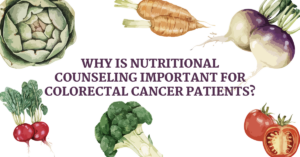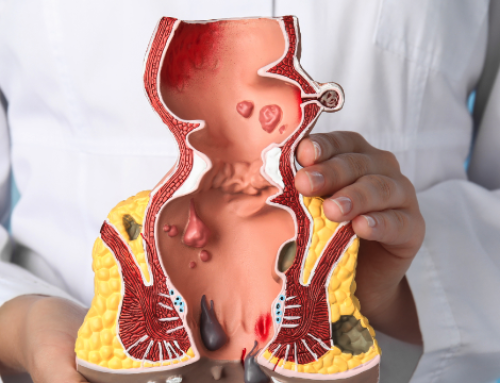
Colorectal cancer (CRC) is a serious illness that affects millions of people around the world. According to the American Cancer Society, CRC is the third most commonly diagnosed cancer and the second leading cause of cancer deaths in the United States alone. While there are various treatments available for CRC patients, nutrition plays a crucial role in their overall health and recovery. Nutritional counseling can help CRC patients improve their nutritional status, quality of life, and even clinical outcomes!
The importance of improving nutritional status
One recent study published in June 2022 conducted on CRC patients found that nutritional counseling significantly improved their nutritional status and quality of life compared to standard care. The study found that patients who received individualized nutritional counseling had:
- Higher protein intake
- Lower intake of saturated fat
- Higher intake of dietary fiber
- Better appetite
- Less fatigue
- Better social functioning
- Lower incidence of postoperative complications
- Shorter hospital stay
In addition, nutritional interventions were also associated with reduced morbidity and mortality in cancer patients. Pretty impressive, right?
How do cancer treatments impact patients?
One of the reasons why nutritional counseling is important for CRC patients is that cancer treatments can significantly affect their nutritional status. Chemotherapy and radiation therapy can cause side effects such as nausea, vomiting, and loss of appetite, which can lead to malnutrition.
Surgery can also affect a patient’s ability to eat and digest food. Nutritional counseling can not only help CRC patients maintain a healthy weight, reduce inflammation, and improve their immune function, but it can also help reduce the risk of cancer recurrence and improve the effectiveness of cancer treatments.
Can nutritional counseling help CRC symptoms?
Nutritional counseling can help CRC patients manage their symptoms and improve their quality of life. According to the American Cancer Society, malnutrition can lead to fatigue, weakness, and a decreased ability to fight infection. Nutritional counseling can help patients mitigate these effects by maintaining a well-balanced diet that will meet their nutritional needs, improving their strength, antioxidants, and increased ability to fight infection.
“Among the nutrients most lost by colorectal cancer patients, the following should be mentioned: vitamin D, selenium, zinc, iron, vitamin C, vitamin E, folic acid and electrolytes [4,5,6,29]. For this reason, as well as due to insufficient food intake, reduced ability to digest and absorb food and disturbed homeostasis of the body (inflammation, mobilization of body reserves for energy purposes or the predominance of catabolic over anabolic reactions), patients with cancer rapidly develop numerous nutritional deficiencies . . . The restoration of these reserves is significant because of the greater risk of developing further cancerous changes than in other people.”
According to this study, many patients are chronically deficient in essential vitamins due to the disease and can greatly benefit from nutritional counseling because it restores their vitamin reserves and helps prevent further cancer development and symptom management.
In conclusion
Nutritional counseling is an important intervention for CRC patients. Nutritional counseling can help patients meet their nutritional needs during treatment, improve their quality of life, and reduce the risk of postoperative complications.
As Dr. Charles D. Blanke, MD, FACP, Chair of the Gastrointestinal Oncology Disease Site Committee of the Southwest Oncology Group, states, “It is increasingly clear that what we eat can affect how we feel and how our bodies fight cancer. Nutritional counseling has an important role to play in the overall care of cancer patients.” This is why I believe that healthcare professionals should consider incorporating nutritional counseling into the treatment plan of CRC patients to improve their overall health and well-being and why I always provide nutritional counseling at my offices.
For more information on the nutritional counseling I provide, please visit my website. I’d love to support you throughout your CRC journey to better health.




